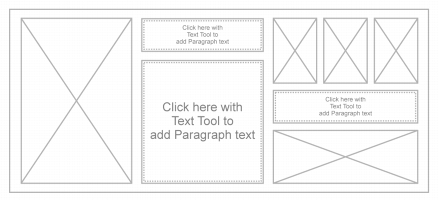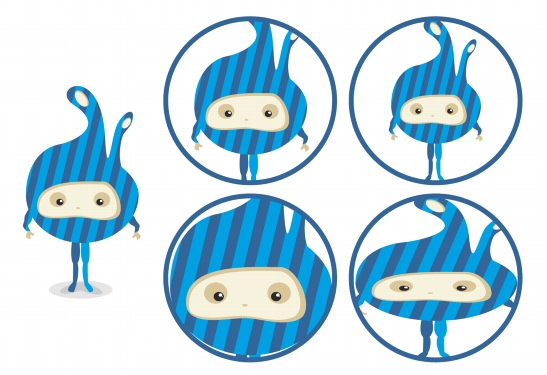
Quick links to procedures on this page:
• |
• |
• |
• |
• |
• |
• |
• |
• |
• |
CorelDRAW lets you place vector objects and bitmaps, such as photos, inside other objects, or frames. A frame can be any object, for example artistic text or a rectangle. When the object is larger than the frame, the object, called the contents, is cropped to fit the form of the frame. This creates a PowerClip object.

Objects before becoming a PowerClip object: artistic text and a bitmap
You can create more complex PowerClip objects by placing one PowerClip object inside another PowerClip object to produce a nested PowerClip object. You can also copy the contents of one PowerClip object to another PowerClip object.

In the PowerClip object, the artistic text is the frame, and the bitmap forms the contents. The bitmap is shaped to the letters of the artistic text.
You can create an empty PowerClip frame from an object, or convert a PowerClip frame back to an object. Creating empty PowerClip frames or text frames is useful when you want to define the layout of your document before adding the content. For more information about text frames, see Adding paragraph text. After you create an empty PowerClip frame, you can add contents to it. You can also add contents to a PowerClip frame that already contains another object.

Creating empty PowerClip frames and text frames is useful when you want to visualize your page layout before adding the contents.
After you create a PowerClip object, you can select or edit its contents, or reposition the contents inside the frame. Whenever a PowerClip object is selected, a floating toolbar appears.
The PowerClip toolbar lets you edit, select, extract, lock, or reposition the contents inside the frame. The toolbar appears whenever a PowerClip object is selected.
You can lock the PowerClip contents, so that when you move the frame, the content moves with it. If you want to delete the contents of a PowerClip object or modify it without affecting the frame, you can extract the contents.
| To create a PowerClip object |
1. |
2. |
Click Effects |
3. |
Click the object that you want to use as a frame.
|
If you want to create a nested PowerClip object, drag the PowerClip object inside another PowerClip object, and hold down the W key as you release the mouse button to place the object inside the frame. |
You can also right-click an object or a group of objects, click PowerClip
inside, and then click the object that you want to use as a container.
|
If the content is placed so that it falls outside the frame in its current position,
it is automatically centered inside the frame to make it visible. To change this
setting, click Tools |
| To create an empty PowerClip frame |
1. |
Select an object that you want to use as a frame.
|
2. |
Click Effects |
You can also right-click the object, choose Frame type, and click Create
empty PowerClip frame.
|
You can also click the PowerClip frame button on the Layout toolbar. To
open the Layout toolbar, click Window |
| To add content to a PowerClip frame |
1. |
Drag an object to the PowerClip frame.
|
When the object approaches the frame, the frame is highlighted. |
2. |
Do one of the following:
|
• |
To add the object to an empty PowerClip frame, release the mouse button.
|
• |
To add the object to a full PowerClip frame, hold down the W key as you release
the mouse button.
|
You can also drag content to the PowerClip frame directly from
Corel CONNECT, or from the Connect docker.
|
If the content is placed so that it falls outside the frame, it is automatically
centered inside the frame to make it visible. To change this setting, click Tools
|
| To convert a PowerClip frame back to an object |
• |
Right-click the PowerClip frame, choose Frame type, and click None.
|
If the frame contains content, the content is deleted when the frame reverts to
a regular object. To avoid losing the content, you can first extract it from the
PowerClip object.
|
You can also click the No frame button on the Layout toolbar. To open the
Layout toolbar, click Window |
| To select the contents of a PowerClip object |
1. |
Select the PowerClip object.
|
The PowerClip toolbar appears. |
2. |
Click the Select contents button on the PowerClip toolbar.
|
| To position the contents inside a PowerClip frame |
1. |
Select a PowerClip object.
|
2. |
Perform a task from the following table.
|
The Fit contents proportionally, Fill frame proportionally, and the Stretch
contents to fill frame commands modify the PowerClip contents. The content
remains modified even if you extract it from the frame.
|
You can also position the contents by clicking the Fit contents button on the
PowerClip toolbar and clicking a command.
|

Examples of PowerClip contents positioned by using the following commands: Center contents (top left), Fit contents proportionally (top right), Fill frame proportionally (bottom left), and Stretch contents to fill frame (bottom right).
| To copy the contents of a PowerClip object |
1. |
Select an object.
|
2. |
Click Effects |
3. |
Click a PowerClip object.
|
| To edit the contents of a PowerClip object |
1. |
Select a PowerClip object.
|
2. |
Click Effects |
3. |
Edit the contents of the PowerClip object.
|
4. |
Click Effects |
While you edit the contents, the frame appears in Wireframe mode and cannot
be selected or edited.
|
You can also double-click the PowerClip object to enable it for editing, or select
the PowerClip object and click the Edit PowerClip button on the PowerClip
toolbar. When you have finished editing the contents, click the Stop editing
contents button.
|
| To lock or unlock the contents of a PowerClip object |
1. |
Select a PowerClip object.
|
2. |
Click Effects |
If you move the frame while the content is unlocked, the content remains
stationary and is not visible until you move the frame over it.
|
You can also right-click a PowerClip object and click Lock contents to
PowerClip, or you can select the PowerClip object and click the Lock
contents to PowerClip button on the PowerClip toolbar.
|
| To extract the contents of a PowerClip object |
1. |
Select a PowerClip object.
|
2. |
Click Effects |
The contents remains in the same location, but it is separated from the frame. The PowerClip frame remains as an empty PowerClip frame. |
You must extract the contents of each level in a nested PowerClip separately.
|
You can also select the PowerClip object and click the Extract contents
button on the PowerClip toolbar.
|
|
|
Copyright 2012 Corel Corporation. All rights reserved.